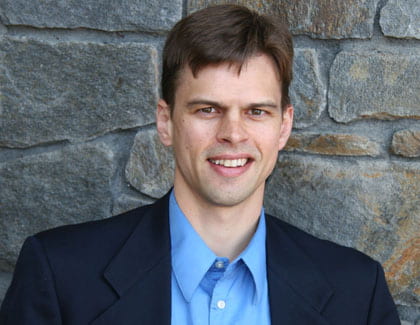Faith and healing
Led by Dr. Aaron Kheriaty, UCI’s Psychiatry & Spirituality Forum opens up rare dialogue among people of differing beliefs

Since its inception just one year ago, UCI’s Psychiatry & Spirituality Forum has attracted an unusual following of Buddhist monks, Catholic priests, rabbis, psychiatrists, physicians, social workers and scientists. From skeptics to believers, all have found a common interest: the connection between mental health and spiritual convictions.
“The forum is an interesting way to connect with the community,” says Dr. Aaron Kheriaty, forum director and psychiatry & human behavior assistant clinical professor. “We started with about 20 people. Now we have 130 members, and many aren’t affiliated with UCI. People are coming out of the woodwork. I hear them say all the time, ‘I’ve been interested in this for years.’”
Members meet once every other month to discuss scholarly work and attend lectures that “open the dialogue between science and religion.” At a recent talk called “It’s Good to Be Good,” Stephen Post, Case Western Reserve University professor, discussed altruism’s effect on the immune system. Among the 100 attendees: The Rev. Robert Schuller, televangelist and Crystal Cathedral pastor.
“He liked the talk because it dove-tailed with his Christian tradition, and non-believing scientists liked it because it was empirical,” Kheriaty says.
Members are interested in all traditions; this fall, the group hosts a talk by Buddhist monk B. Alan Wallace.
“It’s wonderful to see the respectful dialogue. This is what a university is all about – free expression and the debating of ideas about the highest things, the ultimate questions.”
Members aren’t all talk. They engage in research, teaching and community-outreach activities. For example, Kheriaty recently spoke on post-partum depression at a homeless shelter for teenage mothers.
“We’re not just holding lectures on generosity,” he says. “We’re developing an ethos among physicians of giving back to the community.”
Members will conduct a study on the long-term effects of prayer and meditation on the brain, and they’re developing curriculum to help residents “be more comfortable talking about religion and spirituality with patients.”
In August, the forum launched a Mental Health & Spirituality Clinic – a network of physicians attentive to patients’ spiritual issues and willing to collaborate on care with the patient’s spiritual adviser.
For Kheriaty, a Notre Dame alumnus who once considered graduate school in philosophy but chose Georgetown University School of Medicine instead, the forum is “a way to develop my personal and professional interests.”
Dr. Gerald Maguire, senior associate dean of the UC Irvine School of Medicine, approached him with the idea of the forum two years ago. When Kheriaty searched for an existing program to use as a model, he found none. Now others are interested in adopting his model. Kheriaty was even asked to describe the forum’s activities at the annual American Psychiatric Association conference.
“What we’re doing is unique,” Kheriaty says. “There’s nothing else like it anywhere.”
